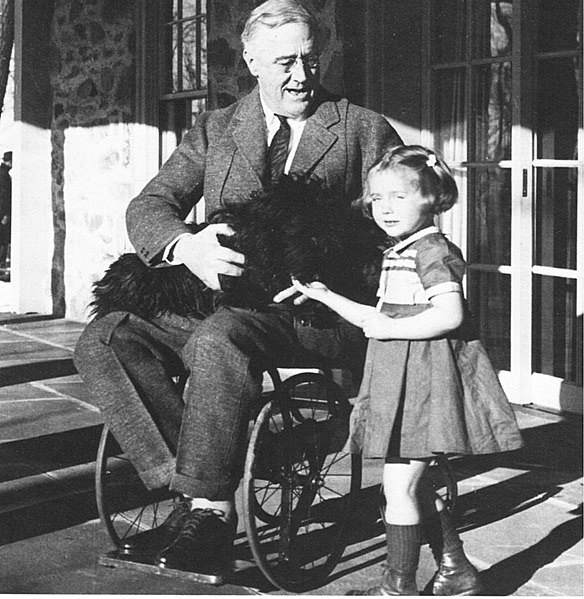Franklin D. Roosevelt was stricken with polio in 1921. From then on he could only walk with the help of others or the use of crutches. That did not keep him from thinking about feet and walking in politically metaphorical terms. "A radical
 is a man with both feet firmly planted—in the air," he told a radio audience in the desperate year of 1939. "A conservative is a man with two perfectly good legs who, however, has never learned to walk forward. A reactionary is a somnambulist walking backwards. A liberal is a man who uses his legs and his hands at the behest . . . of his head." Critics howled with disbelief. The federal government was treading all over regular Americans, walking up one side of the common man and down the other.
is a man with both feet firmly planted—in the air," he told a radio audience in the desperate year of 1939. "A conservative is a man with two perfectly good legs who, however, has never learned to walk forward. A reactionary is a somnambulist walking backwards. A liberal is a man who uses his legs and his hands at the behest . . . of his head." Critics howled with disbelief. The federal government was treading all over regular Americans, walking up one side of the common man and down the other.Eric Arnesen reviews Alan Brinley's biography of FDR over at the Chicago Tribune. He begins with the words of one vociferous critic, who worries that Big Government boots are going to walk all over liberty.
Eric Arnesen, Franklin Delano Roosevelt
By Alan Brinkley
Oxford University Press, 2009, $12.95, 129 pages
At a time of crisis in the American economy, one critic of federal programs charges the administration with stumbling “into philosophies which lead to the surrender of freedom.” It is a “false Liberalism that interprets itself into government dictation,” poisoning “political equality” and “equality of opportunity.” The policies pursed by the administration constitute “the road not to liberty but to less liberty.” What is needed is the “release of the dynamic forces in initiative and enterprise” which “are alone the methods by which these solutions can be found and the purpose of American life assured.”
What had so exercised this critic? The rescue of AIG, the financial sector, and the domestic auto industry? The health care bill that recently emerged triumphant by the narrowest of legislative margins? President Barack Obama’s recess appointments? And just
 who was so exercised? The Republican National Committee chairman Michael Steele? Former Alaska governor Sarah Palin? A libertarian activist? A tea party-er?
who was so exercised? The Republican National Committee chairman Michael Steele? Former Alaska governor Sarah Palin? A libertarian activist? A tea party-er?This time, President Obama is off the hook. The contemporary ring of the attack notwithstanding, this denunciation of liberalism and federal authority and celebration of free enterprise is over seventy-five years old. The critic was former President Herbert Hoover; the year 1934. And what so agitated him was President Franklin D. Roosevelt and his New Deal. Just as Obama has his political enemies to the Right, so too did Roosevelt.
Along with Washington and Lincoln, political historian Alan Brinkley observes, Franklin Roosevelt remains for most Americans “part of the triumvirate of our greatest leaders.” The only political figure to be elected president four times, FDR had his work cut out for him: he not only presided over the nation’s most severe economic crisis ever but he successfully led the United States to victory in a bloody world war that threatened to extinguish democracy around the globe. His legacy during “dark and dangerous years” was “extraordinary,” Brinkley reminds us. “No president since the nation’s founding has done more to shape the character of American government.”
Not surprisingly, then, FDR has attracted considerable attention from historians over the decades. From Arthur M. Schlesinger and James McGregor Burns in the 1950s to Conrad Black, Jean Edward Smith, and H.W. Brands in the early 21st century, the 32nd president has been the subject of numerous biographies, some multi-volume and many extremely long. For all of the thousands of pages – tens of thousands, actually – devoted to exploring his life, Roosevelt remains, Brinkley argues, an “enigmatic man” who has “defied the efforts of so many people who have hoped to understand him fully.” read more >>>






No comments:
Post a Comment